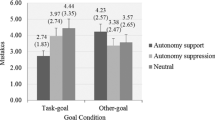Abstract
Considering that achievement motivation is an important variable to explain human behavior, the characteristics of online games can potentially stimulate motivation in some people. The online game Dota 2 has such characteristics as widespread popularity, high and varied complexity and openly accessible data on its participants’ behavior. For the first time, in focusing on the specific behavior and achievement motivation of college students who have played the online game Dota 2, this study utilized a quantitative methodology to study the relationship between them. Based on the achievement motivation scale and structural equation model, this study found that the overall achievement motivation of college students is weak, and reached the conclusion that the total achievement motivation is negative which is obviously different from the previous researches. Achievement motivation has significant influence on online game behavior, and it has both direct and indirect effect on the core behavior of players.
Access this chapter
Tax calculation will be finalised at checkout
Purchases are for personal use only
Similar content being viewed by others
References
Wang, W., et al.: Personality Psychology, p. 79. People’s Medical Publishing House, Shelton (2013)
Zhou, J.: Study on game behavior and motivation of KG players: a case study of Wuhan university students. Zhongnan University of Economics and Law (2019)
Jiao, S., et al.: Social motivation analysis of online games, pp. 121–122. Bridge of Century (2010)
Murray, H.A.: Explorations in Personality. Ford University Press, New York (1938)
McClelland, D.C.: The Achieving Society. Van Nostrand Reinhold (1961)
Gjesme, T., et al.: Achievement-related motives: theoretical considerations and construction of a measuring instrument. University of Oslo (1970)
Bartle, R.: Hearts, clubs, diamonds, spades: players who suit MUDs. J. MUD Res. 1(1), 19 (1996)
Yee, N.: Motivations for play in online games. Cyberpsychol. Behav. 9(6), 772–775 (2006)
Yee, N.: The Proteus Paradox: How Online Games and Virtual Worlds Change Us-and How They Don’t. Yale University Press, New Haven (2014)
Linnenbrink, A., et al.: Multiple Pathways to Learning and Achievement: The Role of Goal Orientation in Fostering Adaptive Motivation, Affect, and Cognition, Intrinsic and Extrinsic Motivation, pp. 195–227. Academic Press, Pittsburgh (2000)
Yang, D., et al.: The relationship between achievement motivation and learning burnout in college students: the mediating role of hope. China J. Health Psychol. 24, 255–259 (2016)
Author information
Authors and Affiliations
Corresponding author
Editor information
Editors and Affiliations
Rights and permissions
Copyright information
© 2022 The Author(s), under exclusive license to Springer Nature Switzerland AG
About this paper
Cite this paper
Zhou, H., Zhu, T., Zhao, N. (2022). Quantitative Relationship Between Achievement Motivation and Game Behavior Based on Structural Equation Model. In: Zu, Q., Tang, Y., Mladenovic, V., Naseer, A., Wan, J. (eds) Human Centered Computing. HCC 2021. Lecture Notes in Computer Science, vol 13795. Springer, Cham. https://doi.org/10.1007/978-3-031-23741-6_13
Download citation
DOI: https://doi.org/10.1007/978-3-031-23741-6_13
Published:
Publisher Name: Springer, Cham
Print ISBN: 978-3-031-23740-9
Online ISBN: 978-3-031-23741-6
eBook Packages: Computer ScienceComputer Science (R0)





